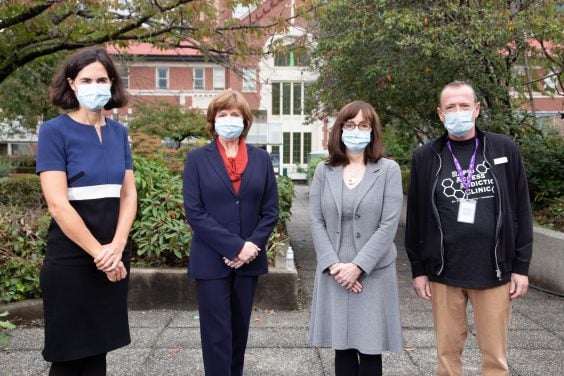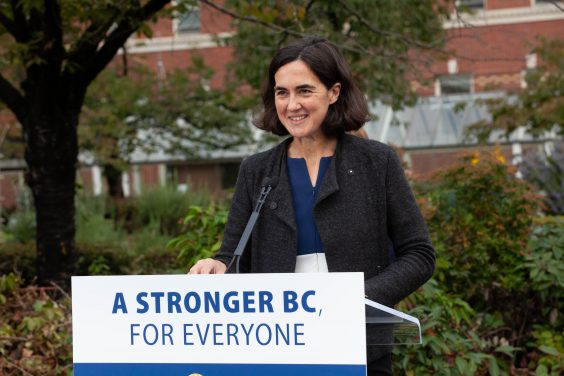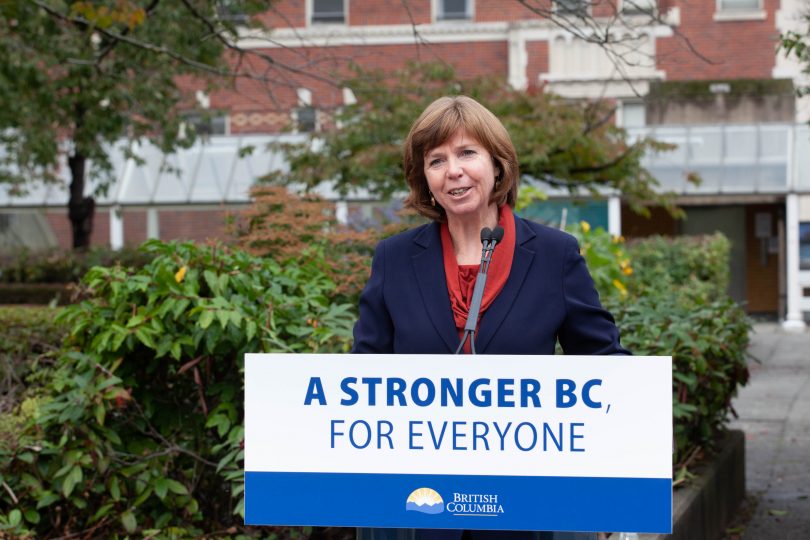St. Paul’s Hospital will get two new full-time peer support workers as part of a provincial push to strengthen care for people with substance use disorders.
Joining staff with the Addiction Medicine Consult Team, the new peer support workers will help remove barriers to ongoing care and work to ensure care is patient-centred and culturally safe.
“Only someone with lived experience can understand addiction,” Mark Haggerty, peer navigator at St. Paul’s Hospital’s Rapid Access Addiction Clinic, said in a statement. “People are apprehensive for many reasons when they come to the hospital, so seeing someone who looks like you, or understands you, or has been where you’ve been immediately puts them at ease.”
$132-million for treatment and recovery
Funding for the new peer support workers is part of a $132 million investment over the next three years for treatment and recovery services across B.C. Sheila Malcolmson, Minister of Mental Health and Addictions, made the announcement today at St. Paul’s Hospital where she acknowledged the many lives lost to toxic drugs in recent years.
“When a person living with addiction is ready to take a step toward recovery, we must ensure services are available when and where they need them,” Malcomson said in a statement. “B.C.’s $132-million investment in treatment and recovery will result in significant improvements everywhere in the province – making substance-use care more seamless, better integrated and easier to access.”

The funding aims to strengthen the full continuum of substance use treatment and recovery services, including withdrawal management, transition and assessment, treatment and aftercare services.
To achieve this, the investment will create more than 65 new or enhanced services throughout B.C., add more than 130 full-time-equivalent staff and open approximately 195 new substance use treatment beds.
Providence Health Care President and CEO Fiona Dalton, who emceed Wednesday’s event, noted that St. Paul’s Hospital cares for some of the most high-risk patient populations in the region.
“In recent years, the provincial government has made important investments at the hospital to address the needs of those needing mental wellness and substance use supports, such as investments into our Mental Health HUB and the Rapid Access Addictions Clinic, but challenges remain in providing peer supports to patients and transitioning them to community settings that best address their needs,” Dalton said. “This major investment will improve and save lives of patients in our hospitals, the Lower Mainland and the whole province.”

Dr. Patricia Daly, chief medical health officer, Vancouver Coastal Health, emphasized that the COVID-19 pandemic has exacerbated the harms associated with the poisoned drug supply, making now a pivotal time to take additional actions to address barriers to accessible quality care.
“I am also very pleased that this announcement is occurring right here at St. Paul’s Hospital,” Dr. Daly added. “The addiction team at this hospital is probably the finest in this country. They have worked tirelessly including through the pandemic to support some of those that are in the greatest need in this province. And I know they will continue to do so as we roll out some of these new initiatives.”
St. Paul’s Hospital one of many facilities positively impacted
Below is a snapshot of new initiatives throughout B.C., with more services to be announced:
Withdrawal management:
- new sobering and assessment centre in Prince George
- new addiction medicine consult team at Burnaby Hospital
- new outpatient withdrawal management services in multiple locations throughout the Interior
- additional funding for withdrawal beds at Vancouver Detox
Transition and assessment:
- new transitional/stabilization beds across Interior Health, ensuring that people receive care planning and connection to treatment after leaving withdrawal management facilities
- enhancing substance-use assessment and/or transition services at Richmond Hospital, Onsite Detox and at St. Paul’s Hospital to ensure people are more easily connected to services and experience more co-ordinated and seamless transitions
Treatment:
- new regional residential treatment beds to support women from the Interior and Island health regions
- expanded adult addictions day treatment services in various communities in the Northern Health region
- extension of the Indigenous-led (Gwa’sala-‘nakwaxda’xw) partnership program for alcohol treatment and recovery in Port Hardy
Aftercare:
- new recovery wellness community centres in two locations in the Vancouver Coastal Health region, to help people on their ongoing recovery journey
- new vocational and occupational therapists for Fraser Health’s Adult Day, Evening and Weekend (DEW) program will support people in reaching their substance-use recovery goals through group and one-on-one employment-focused services
- new peer-support initiatives to support ongoing aftercare in locations throughout the Northern Health region
- new peer-led, trauma-informed education program for people with lived and living experience of addiction in the Vancouver Coastal Health Region
The Ministry of Mental Health and Addictions will be working with health authorities to roll out the full suite of enhancements over the next three years.
Today’s announcement is part of BC Budget 2021’s $500-million investment to address mental health and substance use care. It is in accordance with A Pathway to Hope, the government’s long-term plan for building a comprehensive system of mental health and addictions care.
Read the full BC Government announcement here.





